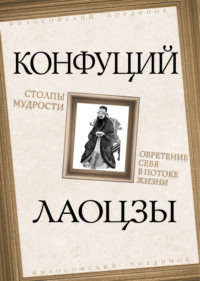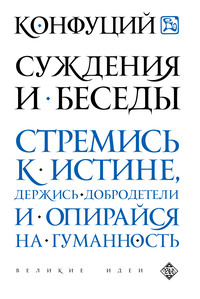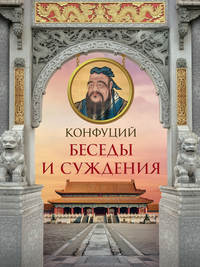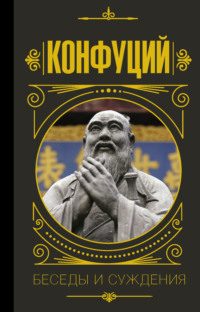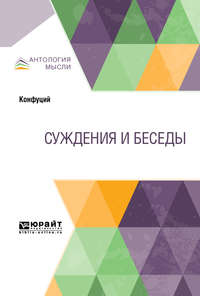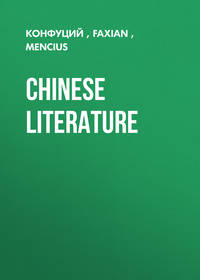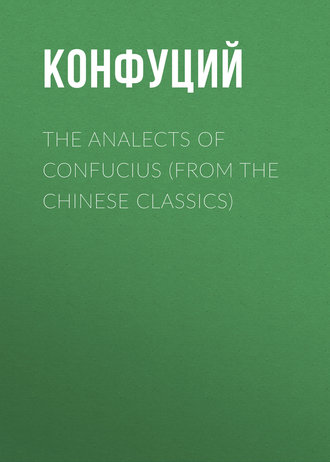 полная версия
полная версияThe Analects of Confucius (from the Chinese Classics)
CHAP. XXI. The Master said, 'Since I cannot get men pursuing the due medium, to whom I might communicate my instructions, I must find the ardent and the cautiously-decided. The ardent will advance and lay hold of truth; the cautiously-decided will keep themselves from what is wrong.'
CHAP. XXII. 1. The Master said, 'The people of the south have a saying— "A man without constancy cannot be either a wizard or a doctor." Good! 2. 'Inconstant in his virtue, he will be visited with disgrace.' 3. The Master said, 'This arises simply from not attending to the prognostication.'
CHAP. XXIII. The Master said, 'The superior man is affable, but not adulatory; the mean man is adulatory, but not affable.'
CHAP. XXIV. Tsze-kung asked, saying, 'What do you say of a man who is loved by all the people of his neighborhood?' The Master replied, 'We may not for that accord our approval of him.' 'And what do you say of him who is hated by all the people of his neighborhood?' The Master said, 'We may not for that conclude that he is bad. It is better than either of these cases that the good in the neighborhood love him, and the bad hate him.'
CHAP. XXV. The Master said, 'The superior man is easy to serve and difficult to please. If you try to please him in any way which is not accordant with right, he will not be pleased. But in his employment of men, he uses them according to their capacity. The mean man is difficult to serve, and easy to please. If you try to please him, though it be in a way which is not accordant with right, he may be pleased. But in his employment of men, he wishes them to be equal to everything.'
CHAP. XXVI. The Master said, 'The superior man has a dignified ease without pride. The mean man has pride without a dignified ease.'
CHAP. XXVII. The Master said, 'The firm, the enduring, the simple, and the modest are near to virtue.'
CHAP. XXVIII. Tsze-lu asked, saying, 'What qualities must a man possess to entitle him to be called a scholar?' The Master said, 'He must be thus,– earnest, urgent, and bland:– among his friends, earnest and urgent; among his brethren, bland.'
CHAP. XXIX. The Master said, 'Let a good man teach the people seven years, and they may then likewise be employed in war.'
CHAP. XXX. The Master said, 'To lead an uninstructed people to war, is to throw them away.'
BOOK XIV. HSIEN WAN
CHAP. I. Hsien asked what was shameful. The Master said, 'When good government prevails in a state, to be thinking only of salary; and, when bad government prevails, to be thinking, in the same way, only of salary;– this is shameful.'
CHAP. II. 1. 'When the love of superiority, boasting, resentments, and covetousness are repressed, this may be deemed perfect virtue.' 2. The Master said, 'This may be regarded as the achievement of what is difficult. But I do not know that it is to be deemed perfect virtue.'
CHAP. III. The Master said, 'The scholar who cherishes the love of comfort is not fit to be deemed a scholar.'
CHAP. IV. The Master said, 'When good government prevails in a state, language may be lofty and bold, and actions the same. When bad government prevails, the actions may be lofty and bold, but the language may be with some reserve.'
CHAP. V. The Master said, 'The virtuous will be sure to speak correctly, but those whose speech is good may not always be virtuous. Men of principle are sure to be bold, but those who are bold may not always be men of principle.'
CHAP. VI. Nan-kung Kwo, submitting an inquiry to Confucius, said, 'I was skillful at archery, and Ao could move a boat along upon the land, but neither of them died a natural death. Yu and Chi personally wrought at the toils of husbandry, and they became possessors of the kingdom.' The Master made no reply; but when Nan-kung Kwo went out, he said, 'A superior man indeed is this! An esteemer of virtue indeed is this!'
CHAP. VII. The Master said, 'Superior men, and yet not always virtuous, there have been, alas! But there never has been a mean man, and, at the same time, virtuous.'
CHAP. VIII. The Master said, 'Can there be love which does not lead to strictness with its object? Can there be loyalty which does not lead to the instruction of its object?'
CHAP. IX. The Master said, 'In preparing the governmental notifications, P'i Shan first made the rough draft; Shi-shu examined and discussed its contents; Tsze-yu, the manager of Foreign intercourse, then polished the style; and, finally, Tsze-ch'an of Tung-li gave it the proper elegance and finish.'
CHAP. X. 1. Some one asked about Tsze-ch'an. The Master said, 'He was a kind man.' 2. He asked about Tsze-hsi. The Master said, 'That man! That man!' 3. He asked about Kwan Chung. 'For him,' said the Master, 'the city of Pien, with three hundred families, was taken from the chief of the Po family, who did not utter a murmuring word, though, to the end of his life, he had only coarse rice to eat.'
CHAP. XI. The Master said, 'To be poor without murmuring is difficult. To be rich without being proud is easy.'
CHAP. XII. The Master said, 'Mang Kung-ch'o is more than fit to be chief officer in the families of Chao and Wei, but he is not fit to be great officer to either of the States Tang or Hsieh.'
CHAP. XIII. 1. Tsze-lu asked what constituted a COMPLETE man. The Master said, 'Suppose a man with the knowledge of Tsang Wu-chung, the freedom from covetousness of Kung-ch'o, the bravery of Chwang of Pien, and the varied talents of Zan Ch'iu; add to these the accomplishments of the rules of propriety and music:– such a one might be reckoned a COMPLETE man.' 2. He then added, 'But what is the necessity for a complete man of the present day to have all these things? The man, who in the view of gain, thinks of righteousness; who in the view of danger is prepared to give up his life; and who does not forget an old agreement however far back it extends:– such a man may be reckoned a COMPLETE man.'
CHAP. XIV. 1. The Master asked Kung-ming Chia about Kung- shu Wan, saying, 'Is it true that your master speaks not, laughs not, and takes not?' 2. Kung-ming Chia replied, 'This has arisen from the reporters going beyond the truth.– My master speaks when it is the time to speak, and so men do not get tired of his speaking. He laughs when there is occasion to be joyful, and so men do not get tired of his laughing. He takes when it is consistent with righteousness to do so, and so men do not get tired of his taking.' The Master said, 'So! But is it so with him?'
CHAP. XV. The Master said, 'Tsang Wu-chung, keeping possession of Fang, asked of the duke of Lu to appoint a successor to him in his family. Although it may be said that he was not using force with his sovereign, I believe he was.'
CHAP. XVI. The Master said, 'The duke Wan of Tsin was crafty and not upright. The duke Hwan of Ch'i was upright and not crafty.'
CHAP. XVII. 1. Tsze-lu said, 'The Duke Hwan caused his brother Chiu to be killed, when Shao Hu died with his master, but Kwan Chung did not die. May not I say that he was wanting in virtue?' 2. The Master said, 'The Duke Hwan assembled all the princes together, and that not with weapons of war and chariots:– it was all through the influence of Kwan Chung. Whose beneficence was like his? Whose beneficence was like his?'
CHAP. XVIII. 1. Tsze-kung said, 'Kwan Chung, I apprehend, was wanting in virtue. When the Duke Hwan caused his brother Chiu to be killed, Kwan Chung was not able to die with him. Moreover, he became prime minister to Hwan.' 2. The Master said, 'Kwan Chung acted as prime minister to the Duke Hwan, made him leader of all the princes, and united and rectified the whole kingdom. Down to the present day, the people enjoy the gifts which he conferred. But for Kwan Chung, we should now be wearing our hair unbound, and the lappets of our coats buttoning on the left side. 3. 'Will you require from him the small fidelity of common men and common women, who would commit suicide in a stream or ditch, no one knowing anything about them?'
CHAP. XIX. 1. The great officer, Hsien, who had been family- minister to Kung-shu Wan, ascended to the prince's court in company with Wan. 2. The Master, having heard of it, said, 'He deserved to be considered WAN (the accomplished).'
CHAP. XX. 1. The Master was speaking about the unprincipled course of the duke Ling of Wei, when Ch'i K'ang said, 'Since he is of such a character, how is it he does not lose his State?' 2. Confucius said, 'The Chung-shu Yu has the superintendence of his guests and of strangers; the litanist, T'o, has the management of his ancestral temple; and Wang-sun Chia has the direction of the army and forces:– with such officers as these, how should he lose his State?'
CHAP. XXI. The Master said, 'He who speaks without modesty will find it difficult to make his words good.'
CHAP. XXII. 1. Chan Ch'ang murdered the Duke Chien of Ch'i. 2. Confucius bathed, went to court, and informed the duke Ai, saying, 'Chan Hang has slain his sovereign. I beg that you will undertake to punish him.' 3. The duke said, 'Inform the chiefs of the three families of it.' 4. Confucius retired, and said, 'Following in the rear of the great officers, I did not dare not to represent such a matter, and my prince says, "Inform the chiefs of the three families of it."' 5. He went to the chiefs, and informed them, but they would not act. Confucius then said, 'Following in the rear of the great officers, I did not dare not to represent such a matter.'
CHAP. XXIII. Tsze-lu asked how a ruler should be served. The Master said, 'Do not impose on him, and, moreover, withstand him to his face.'
CHAP. XXIV. The Master said, 'The progress of the superior man is upwards; the progress of the mean man is downwards.'
CHAP. XXV. The Master said, 'In ancient times, men learned with a view to their own improvement. Now-a-days, men learn with a view to the approbation of others.'
CHAP. XXVI. 1. Chu Po-yu sent a messenger with friendly inquiries to Confucius. 2. Confucius sat with him, and questioned him. 'What,' said he, 'is your master engaged in?' The messenger replied, 'My master is anxious to make his faults few, but he has not yet succeeded.' He then went out, and the Master said, 'A messenger indeed! A messenger indeed!'
CHAP. XXVII. The Master said, 'He who is not in any particular office, has nothing to do with plans for the administration of its duties.'
CHAP. XXVIII. The philosopher Tsang said, 'The superior man, in his thoughts, does not go out of his place.'
CHAP. XXIX. The Master said, 'The superior man is modest in his speech, but exceeds in his actions.'
CHAP. XXX. 1. The Master said, 'The way of the superior man is threefold, but I am not equal to it. Virtuous, he is free from anxieties; wise, he is free from perplexities; bold, he is free from fear. 2. Tsze-kung said, 'Master, that is what you yourself say.'
CHAP. XXXI. Tsze-kung was in the habit of comparing men together. The Master said, 'Tsze must have reached a high pitch of excellence! Now, I have not leisure for this.'
CHAP. XXXII. The Master said, 'I will not be concerned at men's not knowing me; I will be concerned at my own want of ability.'
CHAP. XXXIII. The Master said, 'He who does not anticipate attempts to deceive him, nor think beforehand of his not being believed, and yet apprehends these things readily (when they occur);– is he not a man of superior worth?'
CHAP. XXXIV. 1. Wei-shang Mau said to Confucius, 'Ch'iu, how is it that you keep roosting about? Is it not that you are an insinuating talker?' 2. Confucius said, 'I do not dare to play the part of such a talker, but I hate obstinacy.'
CHAP. XXXV. The Master said, 'A horse is called a ch'i, not because of its strength, but because of its other good qualities.'
CHAP. XXXVI. 1. Some one said, 'What do you say concerning the principle that injury should be recompensed with kindness?' 2. The Master said, 'With what then will you recompense kindness? 3. 'Recompense injury with justice, and recompense kindness with kindness.'
CHAP. XXXVII. 1. The Master said, 'Alas! there is no one that knows me.' 2. Tsze-kung said, 'What do you mean by thus saying— that no one knows you?' The Master replied, 'I do not murmur against Heaven. I do not grumble against men. My studies lie low, and my penetration rises high. But there is Heaven;– that knows me!'
CHAP. XXXVIII. 1. The Kung-po Liao, having slandered Tsze-lu to Chi-sun, Tsze-fu Ching-po informed Confucius of it, saying, 'Our master is certainly being led astray by the Kung-po Liao, but I have still power enough left to cut Liao off, and expose his corpse in the market and in the court.' 2. The Master said, 'If my principles are to advance, it is so ordered. If they are to fall to the ground, it is so ordered. What can the Kung-po Liao do where such ordering is concerned?'
CHAP. XXXIX. 1. The Master said, 'Some men of worth retire from the world. 2. Some retire from particular states. 3. Some retire because of disrespectful looks. 4. Some retire because of contradictory language.'
CHAP. XL. The Master said, 'Those who have done this are seven men.'
CHAP. XLI. Tsze-lu happening to pass the night in Shih-man, the gatekeeper said to him, 'Whom do you come from?' Tsze-lu said, 'From Mr. K'ung.' 'It is he,– is it not?'– said the other, 'who knows the impracticable nature of the times and yet will be doing in them.'
CHAP. XLII. 1. The Master was playing, one day, on a musical stone in Wei, when a man, carrying a straw basket, passed the door of the house where Confucius was, and said, 'His heart is full who so beats the musical stone.' 2. A little while after, he added, 'How contemptible is the one-ideaed obstinacy those sounds display! When one is taken no notice of, he has simply at once to give over his wish for public employment. "Deep water must be crossed with the clothes on; shallow water may be crossed with the clothes held up."' 3. The Master said, 'How determined is he in his purpose! But this is not difficult!'
CHAP. XLIII. 1. Tsze-chang said, 'What is meant when the Shu says that Kao-tsung, while observing the usual imperial mourning, was for three years without speaking?' 2. The Master said, 'Why must Kao-tsung be referred to as an example of this? The ancients all did so. When the sovereign died, the officers all attended to their several duties, taking instructions from the prime minister for three years.'
CHAP. XLIV. The Master said, 'When rulers love to observe the rules of propriety, the people respond readily to the calls on them for service.'
CHAP. XLV. Tsze-lu asked what constituted the superior man. The Master said, 'The cultivation of himself in reverential carefulness.' 'And is this all?' said Tsze-lu. 'He cultivates himself so as to give rest to others,' was the reply. 'And is this all?' again asked Tsze-lu. The Master said, 'He cultivates himself so as to give rest to all the people. He cultivates himself so as to give rest to all the people:– even Yao and Shun were still solicitous about this.'
CHAP. XLVI. Yuan Zang was squatting on his heels, and so waited the approach of the Master, who said to him, 'In youth not humble as befits a junior; in manhood, doing nothing worthy of being handed down; and living on to old age:– this is to be a pest.' With this he hit him on the shank with his staff.
CHAP. XLVI. 1. A youth of the village of Ch'ueh was employed by Confucius to carry the messages between him and his visitors. Some one asked about him, saying, 'I suppose he has made great progress.' 2. The Master said, 'I observe that he is fond of occupying the seat of a full-grown man; I observe that he walks shoulder to shoulder with his elders. He is not one who is seeking to make progress in learning. He wishes quickly to become a man.'
BOOK XV. WEI LING KUNG
CHAP. I. 1. The Duke Ling of Wei asked Confucius about tactics. Confucius replied, 'I have heard all about sacrificial vessels, but I have not learned military matters.' On this, he took his departure the next day. 2. When he was in Chan, their provisions were exhausted, and his followers became so ill that they were unable to rise. 3. Tsze-lu, with evident dissatisfaction, said, 'Has the superior man likewise to endure in this way?' The Master said, 'The superior man may indeed have to endure want, but the mean man, when he is in want, gives way to unbridled license.'
CHAP. II. 1. The Master said, 'Ts'ze, you think, I suppose, that I am one who learns many things and keeps them in memory?' 2. Tsze-kung replied, 'Yes,– but perhaps it is not so?' 3. 'No,' was the answer; 'I seek a unity all-pervading.'
CHAP. III. The Master said, 'Yu, those who know virtue are few.'
CHAP. IV. The Master said, 'May not Shun be instanced as having governed efficiently without exertion? What did he do? He did nothing but gravely and reverently occupy his royal seat.'
CHAP. V. 1. Tsze-chang asked how a man should conduct himself, so as to be everywhere appreciated. 2. The Master said, 'Let his words be sincere and truthful, and his actions honourable and careful;– such conduct may be practised among the rude tribes of the South or the North. If his words be not sincere and truthful and his actions not honourable and careful, will he, with such conduct, be appreciated, even in his neighborhood? 3. 'When he is standing, let him see those two things, as it were, fronting him. When he is in a carriage, let him see them attached to the yoke. Then may he subsequently carry them into practice.' 4. Tsze-chang wrote these counsels on the end of his sash.
CHAP. VI. 1. The Master said, 'Truly straightforward was the historiographer Yu. When good government prevailed in his State, he was like an arrow. When bad government prevailed, he was like an arrow. 2. A superior man indeed is Chu Po-yu! When good government prevails in his state, he is to be found in office. When bad government prevails, he can roll his principles up, and keep them in his breast.'
CHAP. VII. The Master said, 'When a man may be spoken with, not to speak to him is to err in reference to the man. When a man may not be spoken with, to speak to him is to err in reference to our words. The wise err neither in regard to their man nor to their words.'
CHAP. VIII. The Master said, 'The determined scholar and the man of virtue will not seek to live at the expense of injuring their virtue. They will even sacrifice their lives to preserve their virtue complete.'
CHAP. IX. Tsze-kung asked about the practice of virtue. The Master said, 'The mechanic, who wishes to do his work well, must first sharpen his tools. When you are living in any state, take service with the most worthy among its great officers, and make friends of the most virtuous among its scholars.'
CHAP. X. 1. Yen Yuan asked how the government of a country should be administered. 2. The Master said, 'Follow the seasons of Hsia. 3. 'Ride in the state carriage of Yin. 4. 'Wear the ceremonial cap of Chau. 5. 'Let the music be the Shao with its pantomimes. 6. Banish the songs of Chang, and keep far from specious talkers. The songs of Chang are licentious; specious talkers are dangerous.'
CHAP. XI. The Master said, 'If a man take no thought about what is distant, he will find sorrow near at hand.'
CHAP. XII. The Master said, 'It is all over! I have not seen one who loves virtue as he loves beauty.'
CHAP. XIII. The Master said, 'Was not Tsang Wan like one who had stolen his situation? He knew the virtue and the talents of Hui of Liu-hsia, and yet did not procure that he should stand with him in court.'
CHAP. XIV. The Master said, 'He who requires much from himself and little from others, will keep himself from being the object of resentment.'
CHAP. XV. The Master said, 'When a man is not in the habit of saying— "What shall I think of this? What shall I think of this?" I can indeed do nothing with him!'
CHAP. XVI. The Master said, 'When a number of people are together, for a whole day, without their conversation turning on righteousness, and when they are fond of carrying out the suggestions of a small shrewdness;– theirs is indeed a hard case.'
CHAP. XVII. The Master said, 'The superior man in everything considers righteousness to be essential. He performs it according to the rules of propriety. He brings it forth in humility. He completes it with sincerity. This is indeed a superior man.'
CHAP. XVIII. The Master said, 'The superior man is distressed by his want of ability. He is not distressed by men's not knowing him.'
CHAP. XIX. The Master said, 'The superior man dislikes the thought of his name not being mentioned after his death.'
CHAP. XX. The Master said, 'What the superior man seeks, is in himself. What the mean man seeks, is in others.'
CHAP. XXI. The Master said, 'The superior man is dignified, but does not wrangle. He is sociable, but not a partizan.'
CHAP. XXII. The Master said, 'The superior man does not promote a man simply on account of his words, nor does he put aside good words because of the man.'
CHAP. XXIII. Tsze-kung asked, saying, 'Is there one word which may serve as a rule of practice for all one's life?' The Master said, 'Is not RECIPROCITY such a word? What you do not want done to yourself, do not do to others.'
CHAP. XXIV. 1. The Master said, 'In my dealings with men, whose evil do I blame, whose goodness do I praise, beyond what is proper? If I do sometimes exceed in praise, there must be ground for it in my examination of the individual. 2. 'This people supplied the ground why the three dynasties pursued the path of straightforwardness.'
CHAP. XXV. The Master said, 'Even in my early days, a historiographer would leave a blank in his text, and he who had a horse would lend him to another to ride. Now, alas! there are no such things.'
CHAP. XXVI. The Master said, 'Specious words confound virtue. Want of forbearance in small matters confounds great plans.'
CHAP. XXVII. The Master said, 'When the multitude hate a man, it is necessary to examine into the case. When the multitude like a man, it is necessary to examine into the case.'
CHAP. XXVIII. The Master said, 'A man can enlarge the principles which he follows; those principles do not enlarge the man.'
CHAP. XXIX. The Master said, 'To have faults and not to reform them,– this, indeed, should be pronounced having faults.'
CHAP. XXX. The Master said, 'I have been the whole day without eating, and the whole night without sleeping:– occupied with thinking. It was of no use. The better plan is to learn.'
CHAP. XXXI. The Master said, 'The object of the superior man is truth. Food is not his object. There is plowing;– even in that there is sometimes want. So with learning;– emolument may be found in it. The superior man is anxious lest he should not get truth; he is not anxious lest poverty should come upon him.'
CHAP. XXXII. 1. The Master said, 'When a man's knowledge is sufficient to attain, and his virtue is not sufficient to enable him to hold, whatever he may have gained, he will lose again. 2. 'When his knowledge is sufficient to attain, and he has virtue enough to hold fast, if he cannot govern with dignity, the people will not respect him. 3. 'When his knowledge is sufficient to attain, and he has virtue enough to hold fast; when he governs also with dignity, yet if he try to move the people contrary to the rules of propriety:– full excellence is not reached.'
CHAP. XXXIII. The Master said, 'The superior man cannot be known in little matters; but he may be intrusted with great concerns. The small man may not be intrusted with great concerns, but he may be known in little matters.'
CHAP. XXXIV. The Master said, 'Virtue is more to man than either water or fire. I have seen men die from treading on water and fire, but I have never seen a man die from treading the course of virtue.'
CHAP. XXXV. The Master said, 'Let every man consider virtue as what devolves on himself. He may not yield the performance of it even to his teacher.'
CHAP. XXXVI. The Master said, 'The superior man is correctly firm, and not firm merely.'
CHAP. XXXVII. The Master said, 'A minister, in serving his prince, reverently discharges his duties, and makes his emolument a secondary consideration.'
CHAP. XXXVIII. The Master said, 'In teaching there should be no distinction of classes.'
CHAP. XXXIX. The Master said, 'Those whose courses are different cannot lay plans for one another.'
CHAP. XL. The Master said, 'In language it is simply required that it convey the meaning.'



